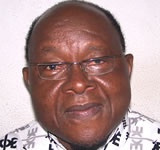The Ministry of Energy and the Ghana National Petroleum Corporation (GNPC) are tight-lipped over the terms and circumstances under which the latter, came to acquire full ownership of Western Telesystems (Ghana) Limited (Westel), the second national telecommunications operator.
The Minister of Energy, Professor Mike Oquaye, indicated to The Chronicle last week that government had supported GNPC to acquire ACG Telesystems' 66% shareholders in Westel, but would not say in what form that support had come.
An undated press release signed by the Board chairman of GNPC, Mr. S. Sekyere-Abankwa, who is also the Managing Director of Prudential Bank had announced the oil corporation's complete ownership of Westel but without details.
The Managing Director (MD) of GNPC, Mr. Moses Boateng, who was the first to be contacted by the paper, shied away from the reporter, referring all Westel matters to the Board Chairman.
After several weeks of fruitless attempts to get the GNPC Board chairman to respond to questions on the transaction, Prof. Oquaye, also a Bible-thumping Baptist Minister and political scientist, confirmed that 10 million dollars had been the acquisition price, but would not confirm whether Bank of Ghana had been the source of funding, except to say that the acquisition could have been by a credit facility.
Asked about the source of funding, he noted that government raises money for every good cause and that this was the situation in the case of GNPC's acquisition.
On why GNPC, which, since 2001 was supposed to be concentrating on its core business of oil exploration, would now fully own a telecom facility, Prof. Oquaye noted that the opportunity to buy came out of an international arbitration, initiated by its previous partners, Western Wireless Limited (WWI), following a dispute with the government.
It was therefore negotiated out of the arbitration settlement to buy them off at the sum of US$10million, which government accordingly supported GNPC to acquire.
He stressed that government intends to sell it, with the hope that it would realize some US$60 million back for it to be sold to a reputable international operator who would operate the facility along international standards.
He disclosed that the 33% shares of government even before the acquisition would also be sold later on the stock market to the general public, when "as a result of the company being in operation, the share value would then have gone up and government would even make more money from that particular transaction."
According to him, if everything went well for the shares to be sold at the targeted US$60million, that would mean a profit to the government and people of Ghana, and this would encourage the privatization drive.
Asked whether this acquisition was budgeted for, he said, "If we allowed this case to go on and Government of Ghana had a judgement against it for US$20million or US$30million, it is not something that we budgeted to go and pay".
This he said is because we owed and that we needed to fulfil the terms of payment, since in default Ghanaian assets abroad could be seized, stressing, "These issues are not necessarily budgetary, but are matters that had to be dealt with prudently as and when they occur."
The minister was not forthcoming on who had approved the purchase, saying, "We are still in the middle of a number of negotiations, which we believe must take place in order for us to make good value and for that matter, these are not some of the things that at such a stage you would want to talk too much about, otherwise we always spoil things for ourselves".
These things, he said require a lot of prudence in order not for people to shy away from them as a matter of bad publicity, saying that there are many reputable people who respect themselves and would not want to have anything to do with slinging mud.
"In that case, we have not reached the stage, whenever we reach a stage where certain approvals are required, they would be taken," he noted.
Professor Oquaye further noted that unlike in previous times government had asked management to concentrate on its core business of oil exploration. That he said, does not mean disposing of those goods but working on them for a better value for the country.
"They are very delicate negotiations which should not be done by way of calling the dog a bad name and hanging it."
Prof. Oquaye would not disclose to The Chronicle the stage of discussions with MTN, nor comment about a November 2000 MOU the Tsatsu Tsikata administration had signed, providing for MTN to take the place of Western Wireless Inc (WWI) as technical partner in Westel.
Click to view details



General News of Friday, 20 January 2006
Source: Chronicle
Minister's Non-Transparent Deals Over Westel

















